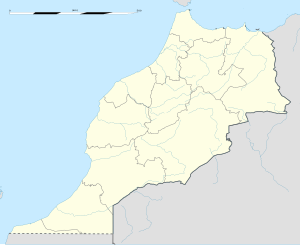
Algeria, officially the People's Democratic Republic of Algeria, is a country in the Maghreb region of North Africa. It is bordered to the northeast by Tunisia; to the east by Libya; to the southeast by Niger; to the southwest by Mali, Mauritania, and Western Sahara; to the west by Morocco; and to the north by the Mediterranean Sea. The capital and largest city is Algiers, located in the far north on the Mediterranean coast.

North Africa is a region encompassing the northern portion of the African continent. There is no singularly accepted scope for the region, and it is sometimes defined as stretching from the Atlantic shores of the Western Sahara in the west, to Egypt and Sudan's Red Sea coast in the east.

Berbers, or the Berber peoples, also called by their endonym Amazigh or Imazighen, are a diverse grouping of distinct ethnic groups indigenous to North Africa who predate the arrival of Arabs in the Arab migrations to the Maghreb. Their main connections are identified by their usage of Berber languages, most of them mutually unintelligible, which are part of the Afroasiatic language family. They are indigenous to the Maghreb region of North Africa, where they live in scattered communities across parts of Morocco, Algeria, Libya, and to a lesser extent Tunisia, Mauritania, northern Mali and northern Niger. Smaller Berber communities are also found in Burkina Faso and Egypt's Siwa Oasis.

The present day Republic of Tunisia, al-Jumhuriyyah at-Tunisiyyah, is situated in Northern Africa. Geographically situated between Libya to the east, Algeria to the west and the Mediterranean Sea to the north. Tunis is the capital and the largest city ; it is near the ancient site of the city of Carthage.
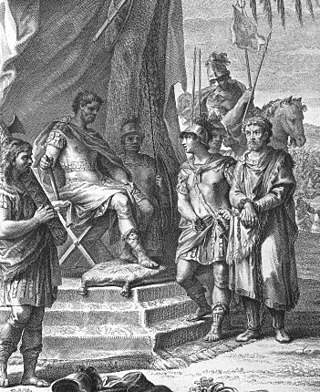
Jugurtha or Jugurthen was a king of Numidia. When the Numidian king Micipsa, who had adopted Jugurtha, died in 118 BC, Jugurtha and his two adoptive brothers, Hiempsal and Adherbal, succeeded him. Jugurtha arranged to have Hiempsal killed and, after a civil war, defeated and killed Adherbal in 112 BC.
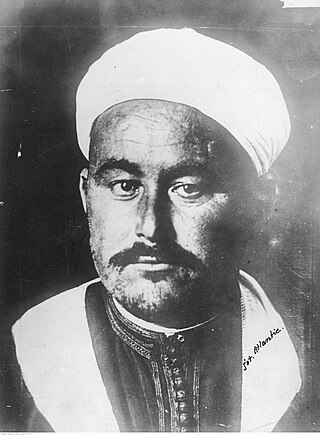
Muhammad bin ‘Abd al-Karīm al-Khaṭābī, better known as Abd el-Krim, was a Moroccan political and military leader and the president of the Republic of the Rif. He and his brother M'Hammad led a large-scale revolt by a coalition of Riffian tribes against the Spanish and French Protectorates of the Rif and the rest of Morocco. His guerrilla tactics, which included the first-ever use of tunneling as a technique of modern warfare, directly influenced Ho Chi Minh, Mao Zedong and Che Guevara. He also became one of the major figures of Arab nationalism, which he actively supported.
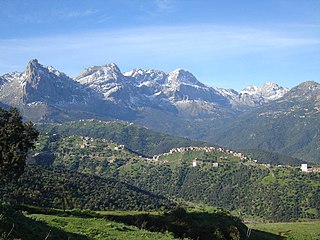
Kabylia or Kabylie is a mountainous coastal region in northern Algeria and the homeland of the Kabyle people. It is part of the Tell Atlas mountain range and is located at the edge of the Mediterranean Sea.
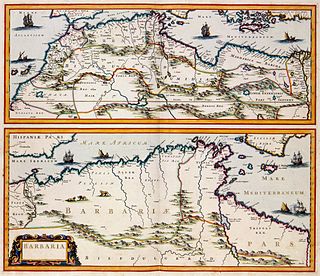
The Barbary Coast was the name given to the coastal regions of central and western North Africa or more specifically the Maghreb and the Ottoman borderlands consisting of the regencies in Algiers, Tunis, and Tripoli, as well as the Sultanate of Morocco from the 16th to 19th centuries. The term originates from an exonym for the Berbers.
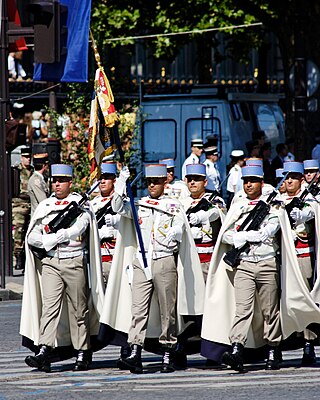
Spahis were light-cavalry regiments of the French army recruited primarily from the Arab and Berber populations of Algeria, Tunisia and Morocco. The modern French Army retains one regiment of Spahis as an armoured unit, with personnel now recruited in mainland France. Senegal also maintains a mounted unit with spahi origins as a presidential escort: the Red Guard.
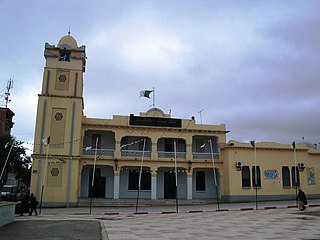
Khenchela is the capital city of the administrative Khenchela Province (Wilaya), in the north east of Algeria. Situated in the Aures Mountains, 1200 m above sea level. The city is mainly populated by Berber Chaouis.

The Muslim conquest of the Iberian Peninsula, also known as the Arab conquest of Spain, by the Umayyad Caliphate occurred between approximately 711 and the 714. The conquest resulted in the destruction of the Christian Visigothic Kingdom of Spain and led to the establishment of a Muslim Arabian-Moorish state, Al-Andalus.

The Muslim conquest of the Maghreb or Arab conquest of North Africa by the Rashidun and Umayyad Caliphates commenced in 647 and concluded in 709, when the Byzantine Empire lost its last remaining strongholds to Caliph Al-Walid I. The North African campaigns were part of the century of rapid early Muslim conquests.

Lusius Quietus was a Roman Berber general and 11th legate of Judaea from 117. He was the principal commander against the Jewish rebellion known as the Kitos War. As both a general and a highly acclaimed commander, he was notably one of the most accomplished Berber statesmen in ancient Roman history. After the death of the emperor Trajan, Quietus was murdered or executed, possibly on the orders of Trajan's successor Hadrian.

The Kabyle people are a Berber ethnic group indigenous to Kabylia in the north of Algeria, spread across the Atlas Mountains, 160 kilometres (100 mi) east of Algiers. They represent the largest Berber population of Algeria and the second largest in North Africa.
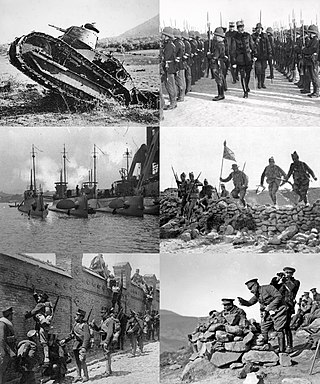
The Rif War was an armed conflict fought from 1921 to 1926 between Spain and the Berber tribes of the mountainous Rif region of northern Morocco.
The Berber Revolt or the Kharijite Revolt of 740–743 AD took place during the reign of the Umayyad Caliph Hisham ibn Abd al-Malik and marked the first successful secession from the Arab caliphate. Fired up by Kharijite puritan preachers, the Berber revolt against their Umayyad Arab rulers began in Tangier in 740, and was led initially by Maysara al-Matghari. The revolt soon spread through the rest of the Maghreb and across the straits to al-Andalus.

Juan Picasso González was a Spanish military man and general who participated in the Rif War with the Spanish Army of Africa in late 19th century and early 20th century. He was a military investigation instructor known for "Expediente Picasso", an investigation report related to the historical defeat of the Spanish Army, some 20,000 soldiers and officers, of which some 8,000 were killed, against the Riffian rebels at the Battle of Annual, on July 1, 1921; known as The disaster of Annual.
Solomon was an East Roman (Byzantine) general from northern Mesopotamia, who distinguished himself as a commander in the Vandalic War and the reconquest of North Africa in 533–534. He spent most of the next decade in Africa as its governor general, combining the military post of magister militum with the civil position of praetorian prefect. Solomon successfully confronted the large-scale rebellion of the native Berbers, but was forced to flee following an army mutiny in spring of 536. His second tenure in Africa began in 539 and it was marked by victories over the Berbers, which led to the consolidation of the Byzantine position. A few years of prosperity followed, but were cut short by the rekindled Berber revolt and Solomon's defeat and death at the Battle of Cillium in 544.

The Mauro-Roman kingdom, also described as the kingdom of Masuna, was a Christian Berber kingdom which dominated much of the ancient Roman province of Mauretania Caesariensis from the capital city of Altava. Scholars are in disagreement about whether the polity aimed for independence as a kingdom or was part of a loose confederation, an alternative hypothesis drawn from contextual knowledge about Berber tribal alliances. In the fifth century, Roman control over the province weakened and Imperial resources had to be concentrated elsewhere, notably in defending the Roman Italy itself from invading Germanic tribes. Moors and Romans in Mauretania came to operate independently from the Empire. However, regional leaders may not have necessarily felt abandoned by the Romans.

The Kingdom of the Aurès was an independent Christian Berber kingdom primarily located in the Aurès Mountains of present-day north-eastern Algeria. Established in the 480s by King Masties following a series of Berber revolts against the Vandalic Kingdom, which had conquered the Roman province of Africa in 435 AD, Aurès would last as an independent realm until the Muslim conquest of the Maghreb in 703 AD when its last monarch, Queen Dihya, was slain in battle.
